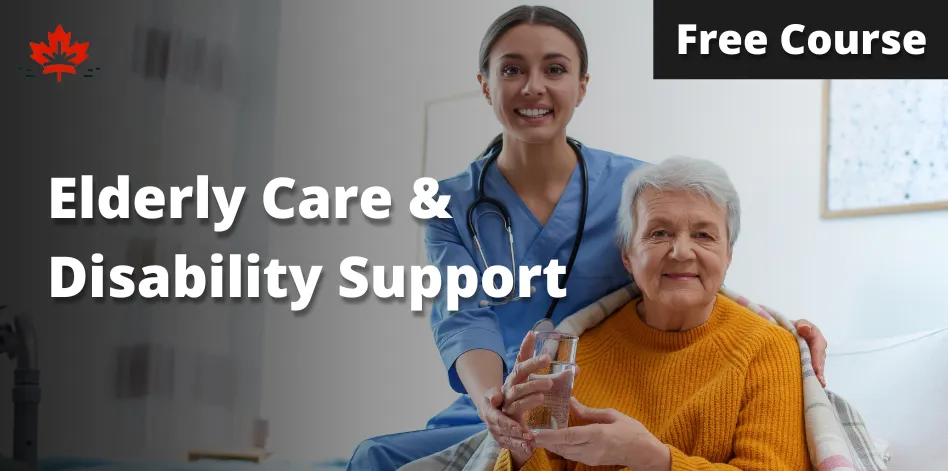We are keenly aware that the need for quality elderly care and disability support is a growing concern, and it’s essential to equip caregivers with the right knowledge and skills. Our spotlight today is on a game-changing opportunity: a comprehensive course that’s not only enriching but also entirely free of charge.
This educational journey is designed to empower those who wish to make a significant impact in the lives of others. Whether you’re a family member looking after a loved one or an aspiring professional in the field, this course will provide you with vital insights into providing exceptional care. The curriculum is structured to ensure that upon completion, participants are well-versed in the best practices of elderly care and disability support.
Have you ever considered empowering yourself with the knowledge and skills to care for the elderly and people with disabilities, but the expense of courses held you back? If so, keep reading, because you’re about to discover a resource that might just transform your life and the lives of those you care for – all without spending a dime.
Unlocking Essential Knowledge: A Free Course on Elderly Care and Disability Support
Elderly care and disability support are areas of growing importance as populations around the world are aging and the need for skilled caregivers continues to increase. With the surge in demand for knowledgeable professionals in this field, accessing high-quality education has never been more critical.
The course on Elderly Care and Disability Support aims to equip learners with the essential skills needed to provide compassionate and effective care to the elderly and people with disabilities. This free program covers a wide range of topics, including understanding the unique needs of these individuals, developing communication strategies to interact with them effectively, and learning about the various health conditions that commonly affect these populations.
Furthermore, the course delves into the ethical considerations of elderly care and disability support. Participants will explore issues such as autonomy, consent, and privacy, ensuring that they are prepared to handle sensitive situations with professionalism and empathy.
Another key component of the training involves practical skills development. Learners will gain insights into how to assist with daily living activities, manage emergency situations, and understand the use of assistive technologies that can greatly enhance the quality of life for those in their care.
Given that this is a free course, it offers an incredible opportunity for individuals who may be considering a career in this field, or for those already working in it who want to further their knowledge and skills without the financial burden that comes with most professional development programs.
Understanding the Basics of Elderly Care and Disability Support
When venturing into the realm of caregiving, especially for the elderly or individuals with disabilities, it’s critical to start with a solid foundation. A free course on Elderly Care and Disability Support should cover the fundamental principles and ethical considerations that are involved in providing support. This includes understanding the different types of needs that individuals may have, whether they’re physical, emotional, cognitive, or social.
Courses often begin by instructing on the anatomy and physiology of aging, common medical conditions affecting older adults, and an overview of disabilities. They should also address person-centered care, which is now seen as the best practice in caregiving. This approach emphasizes the importance of respecting the autonomy and individuality of each person receiving care.
Training should incorporate instruction on how to create an environment that fosters independence, while also ensuring safety. It may also cover basic medical knowledge, such as how to recognize signs of common diseases, understanding medication management, and recognizing emergencies.
Developing Essential Skills for Quality Care
An effective free Elderly Care and Disability Support course should also focus on skill development. Participants need to learn about the communication strategies that are effective with the elderly and those with disabilities, including non-verbal cues and active listening techniques. This ensures that caregivers can communicate effectively, respecting the individual’s condition and abilities.
Other essential skills include learning how to assist with daily living activities, such as bathing, dressing, and mealtimes. Proper techniques for lifting and transferring individuals, in order to avoid injury, are also pivotal. Moreover, courses must stress the importance of maintaining hygiene and infection control standards to protect both the caregiver and the recipient of care.
Furthermore, because mental and emotional health is just as important as physical health, courses should teach caregivers how to support social inclusion and mental stimulation, and how to identify and report signs of elder abuse or neglect.
Finding and Accessing Free Courses on Elderly Care and Disability Support
Locating free courses that offer comprehensive training on Elderly Care and Disability Support can be challenging, but there are resources available for those who seek them. Many community organizations, non-profits, and even some government agencies provide free workshops and courses. These courses might be offered both online and in-person, depending on the provider.
Prospective students can also check with local community colleges or universities, as some might offer these courses for community benefit. Online educational platforms like Coursera, edX, and Alison are increasingly providing courses specifically tailored to caregivers, some of which are sponsored by respected institutions, making high-quality education accessible to all.
It’s important to ensure that the free course you choose is credible and offers accurate, up-to-date information. Look for courses developed by professionals or organizations specializing in elderly care and disability support, and check reviews or testimonials when possible.
